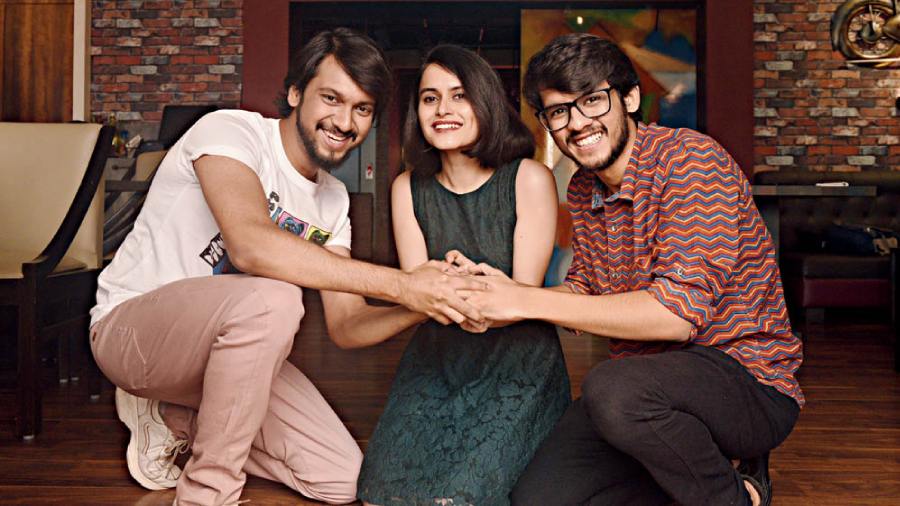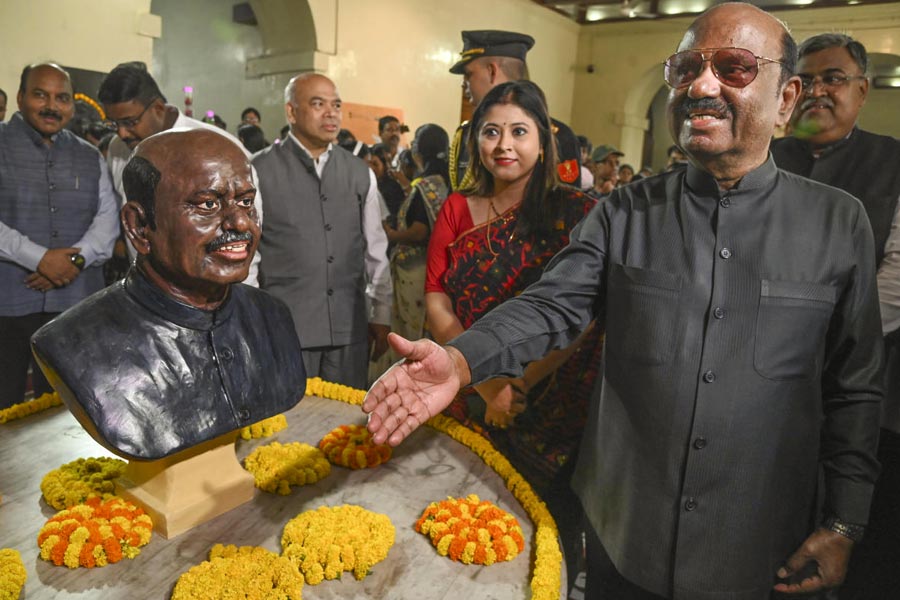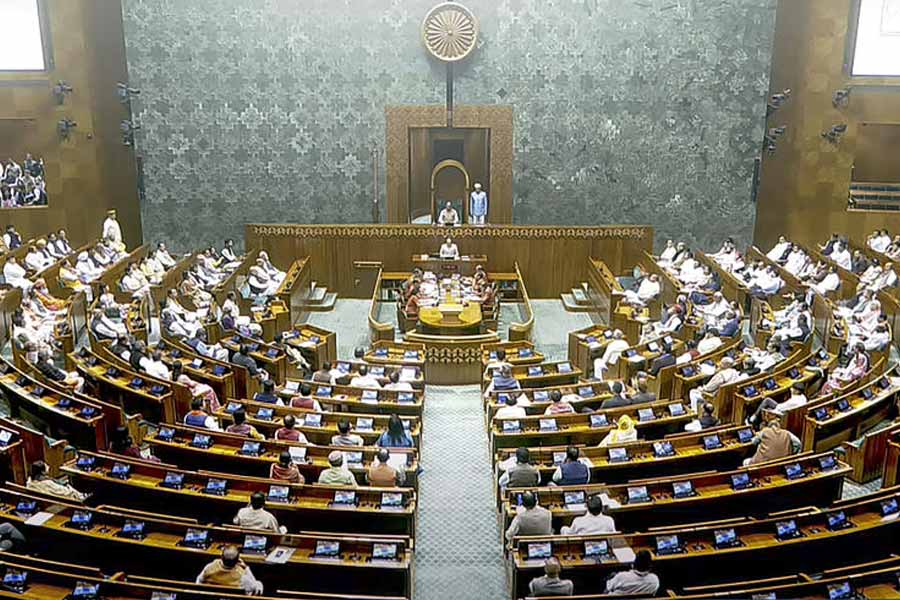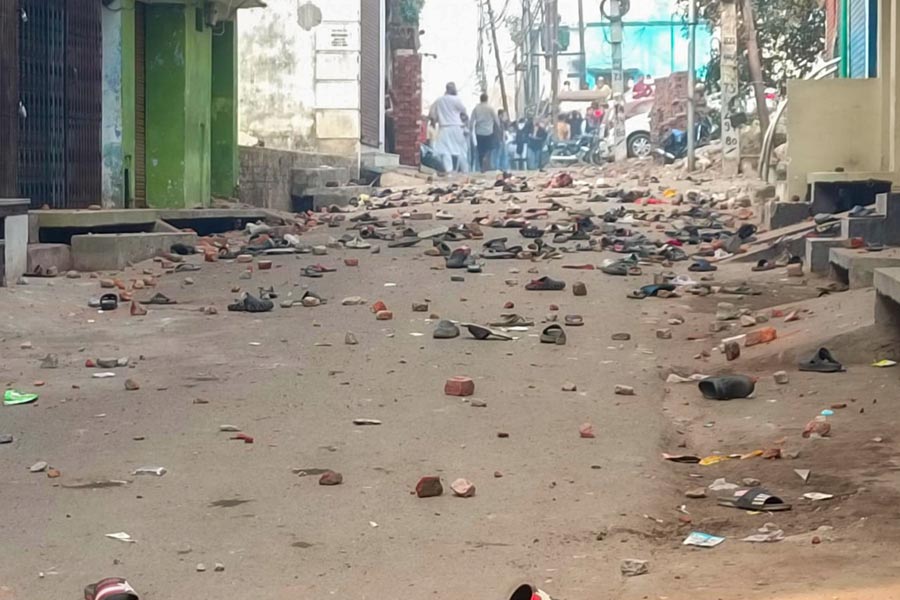Kaushik Ganguly’s latest directorial venture Lokkhi Chhele opens in theatres on August 26, after being held back for two years because of the pandemic. It tells the story of Amir, Shibnath and Gayatri, three young medical students who go to a village and generate awareness about the evils of superstition and religious dogma, so that poor, innocent villagers do not become its victims.
The Telegraph caught up with Ujaan Ganguly, Purab Seal Acharya and Ritwika Pal, the three young actors who portray the leading roles in the film. What followed was a candid conversation on the film, their experiences and the bonds they created which they firmly believe will last forever. Excerpts.
What were your initial reactions when you heard that you would play an important character in the film?
Purab: I was on my way home from college when my mother called up to inform me that Kaushik Ganguly wanted to cast me in his next film. The news was so sudden I didn’t know how to react. Later, when Ujaan called up too, I was certain that it was actually happening. Still, it took me a while to process it. In fact, even after we had begun shooting, I would pinch myself to make sure I was not dreaming!
Ujaan: I had always aspired to work with Kaushik Ganguly, the director. He being my father, I had observed from a very young age, his style of work and his easy compatibility with his team. And I am glad that I could finally earn the opportunity to do so. I am grateful to Windows for recommending my dad to cast me in this film. After I read the script, I felt even more enthusiastic and excited about it.
Ritwika: It is a dream for every Bengali actor to work with a director of Kaushik Ganguly’s stature. When Ujaan — who I know from my theatre and Jadavpur University days —told me that his father would ring me about working in his film, I thought he was pulling my leg. But when Kaushik Ganguly actually called to offer me the role, I couldn’t believe my ears. It sounded too good to be true and took quite a while to sink in.
Tell us something about your individual journey towards becoming movie actors.
Purab: I never dreamed that I would get a chance to act in films. My childhood dream was to drive a car when I grew up. And I was already in my teens when I started pursuing my passion for playing the guitar. It was much later that singer-actor Anindya Chattopadhyay showed me how to act and offered me a role in my first film (Manojder Adbhut Bari). So I guess you could say that being an actor just happened to me.
Ujaan: Even before I ventured into theatre at a very young age, I figured that I wanted to be an actor. Maybe not just an actor, because I also wanted to focus on academics. I wanted to balance my passion for all my diverse interests that also includes writing. Later, I noticed a stronger pull towards camera and acting and decided that I must try out the medium and see whether I was good at it.
Ritwika: I was into theatre big-time ever since I was in school and often got into trouble with my teachers because of this. But I never wanted to be an actor; writing plays was what I wanted to do. But fate had other plans for me. My mother and many others also encouraged me to pursue acting seriously because they felt that I was very good at it. And now, my friends tell me that I am a way better performer on screen than on stage.
Share with us your most memorable experiences during the film’s production.
Purab: The film was mainly shot in a village in Purulia and the whole unit had to put up in a hotel for several weeks. This gave us an opportunity to make friends and also learn a lot from one another’s work. Though I am shy by nature, I could mingle with everyone easily because of the love and warmth all around. That is something I will always remember.
Ujaan: It was a very enjoyable experience for all of us. We would never feel tired even after a full day’s shoot in the heat and dust. The daily afternoon feasts, the teasing and banter during shoots, the music and adda back at the hotel in the evenings, are memories I will always recall fondly. The atmosphere was very festive and positive throughout; every day felt like a celebration.
Ritwika: Aside from their work, Ujaan and Purab concentrated their efforts on playing pranks on me whenever they got a chance. Yet, I must admit that I could not be annoyed at them for long, for I learnt so much from both of them. I learnt from Purab what it means to be dedicated to one’s craft or even passion, while Ujaan’s determination to always give his best in any situation, inspired me to aim for perfection as well.
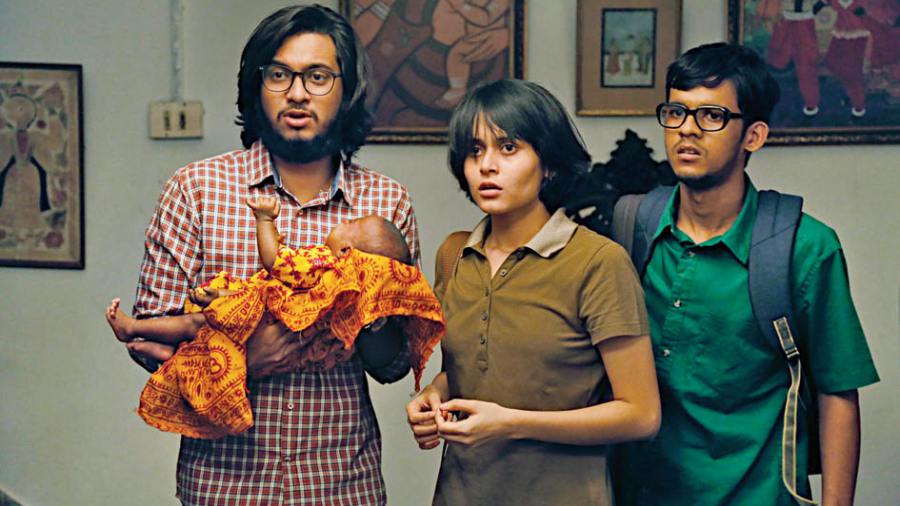
A moment from Lokkhi Chhele, which releases on August 26
Any personal milestones that you achieved while working for Lokkhi Chhele?
Purab: I learned a lot from everyone, particularly my co-actors and my director and I would like to think that it has made me grow both as a person and as an actor. My bonding with each and every member of the unit is something I am proud of, and the relationship I share with them is something I will cherish beyond my association with them as an actor.
Ujaan: My role made me know myself better and sharpened my skills as an actor. When I tried to get under Amir’s (Ujaan’s character in the film) skin in order to understand his feelings and reactions, I thought I discovered hidden aspects of myself, and realised how I differ from him. I also learnt how to see things from other people’s perspectives. And when I did that, I learnt to empathise with people very different from me.
Ritwika: With its gruelling schedules and tight deadlines, this project has, more than any other I have worked on so far, helped me to understand my place in the larger scheme of things. It helped me become more grounded, disciplined and focused on my job. It also made me understand the problems of a section of our society that is neglected and forgotten.
What was it like working with one of the most acclaimed directors of our time, Kaushik Ganguly?
Purab: I have always been in awe of Kaushik Ganguly, and was a little intimidated by the idea of working with him. However, on the very first day of shooting, he made everything seem so simple and made us feel very relaxed and comfortable. I found his instructions easy to follow, and am pleased that I could act exactly the way he wanted me to. Now we are very good friends, and I am super-thrilled about it.
Ujaan: He has been more a friend than a father to me, so there have been no boundaries between him and me. Working with him for the first time, I knew I needed to maintain professional decorum and discipline, and I was happy to do so. But since we have a very good chemistry, it was easy for us to adjust to a professional environment and I am just glad that I could fulfil his expectations of me as an actor.
Ritwika: I had a very particular image of how he would be — very strict, no-nonsense and, of course, a little scary as well. Surprisingly, he was not anything I had imagined him to be. A man of few words, he would give us tiny nuggets of information that would help us act out our scenes. And even when he scolded us, it would benefit us greatly.
Do you think Lokkhi Chhele is relatable in the modern context?
Purab: Certainly. The young doctors in the film try their best in making the rural poor aware of the injustices they are subject to and try to protect them from harm. Through this movie we have tried to show how educated, urban people, particularly the youth, can try to make the lives of villagers better.
Ujaan: The film makes the audience aware of basic problems like illiteracy and poverty which makes villagers easy targets for exploitation through superstition and prejudice. I think that awareness of the problem is important if we want to root it out. And I think that is essential to understand in the contemporary context.
Ritwika: As we all know, superstition and bigotry are serious social evils that persist in our villages, even 75 years after the country gained Independence. I think that this film is not only relatable but it has taken a step in the right direction by pointing out these evils and how they need to be stamped out immediately.
Picture: Rashbehari Das
Location Courtesy: AtomYumm Lounge
Make-up: Natasha Das
Dresser: Lakshman Maity

